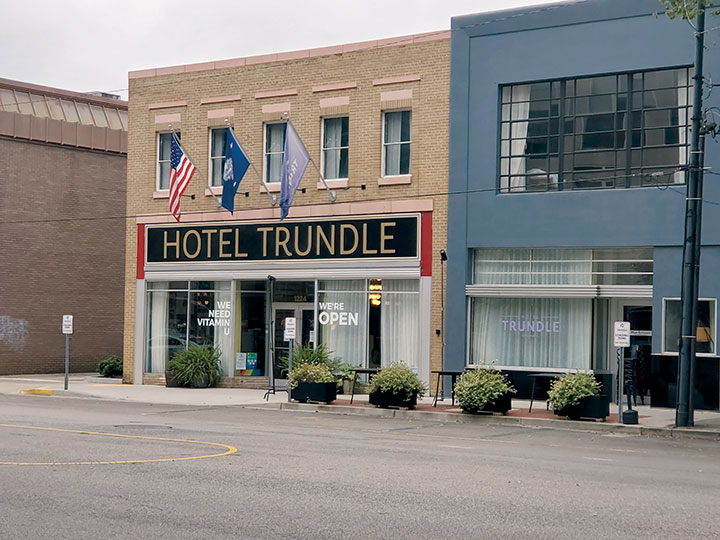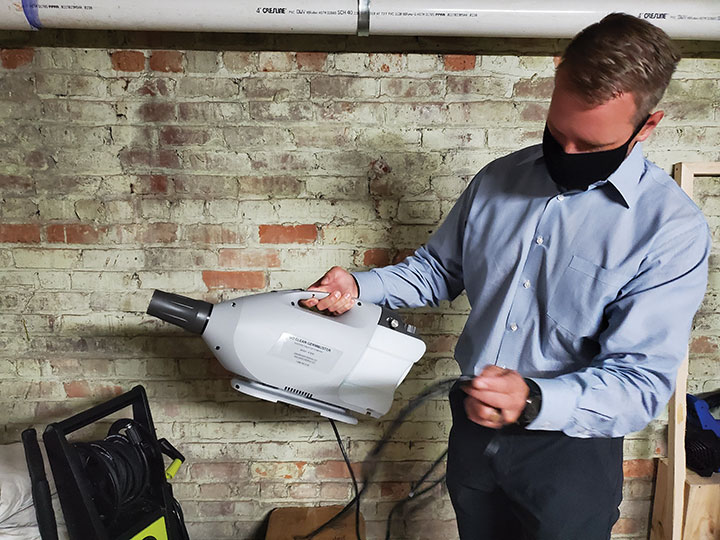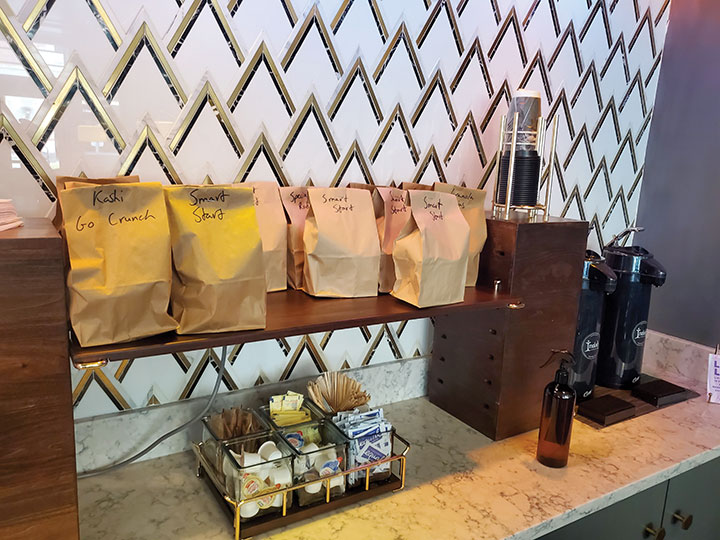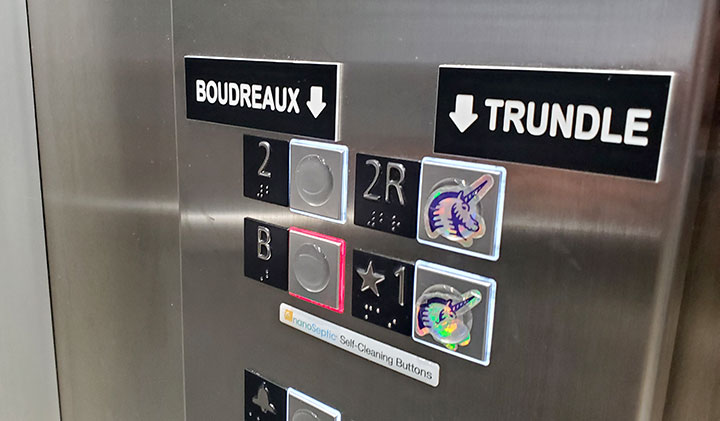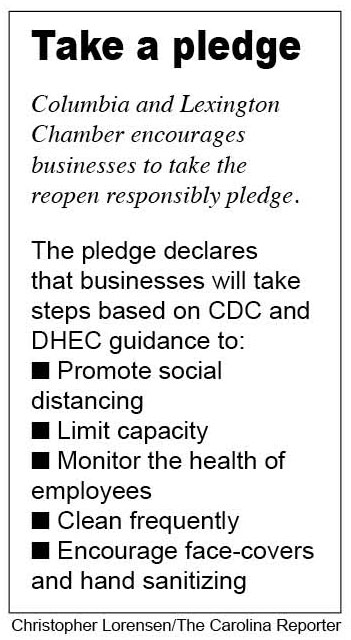Hotel Trundle closed at the start of the pandemic in March and has made various changes to encourage social distancing and cleaner spaces.
Hotels have long been a business where cleanliness is held to high standards. Now, in the time of a pandemic, those standards play a crucial role in preventing the spread of the coronavirus.
For April Steele, executive housekeeper of Hotel Trundle, the coronavirus is not a barrier to cleaning a room between bookings, it’s just another step in the process.
“We all are professional housekeepers, so we already knew the training that we needed and we just needed to step up our game,” Steele said. “Just go a little harder and deep clean a little more.”
Walking into the lobby of the boutique hotel in downtown Columbia, guests will see the normal signs of the pandemic. There are static cleaners built into the door handles, hand sanitizing stations at the elevators and barriers between guests and the receptionist. It’s what is missing however, that shows the real effect of the pandemic on hotel housekeeping.
“They really miss turn down service because we used to give them popcorn in the afternoon and have their bed ready so a lot of guests really do miss the gourmet popcorn,” Steele said.
Hotels are a crucial part of the tourism industry and, with 47 state parks, tourism is a crucial part of the South Carolina economy. According to the South Carolina Department of Parks, Recreation & Tourism, hotel rooms sold were down by about 25% in August.
In a survey done by the American Hotel and Lodging Association, the top activities a hotel can do to make guests feel more comfortable is require staff and guests to wear masks, suspend daily housekeeping and reduce direct contact.
As a boutique hotel, Hotel Trundle tried to offer special amenities, including custom dishware in the rooms for coffee, beer and wine. Hotel owner Marcus Munce said those dishes have that has been removed and replaced with single use items such as paper cups.
“From the beer side we just don’t use our branded pint glasses anymore; we use plastic and the same thing with the wine except instead of a free pouring wine out of a bottle we do single serve wines,” Munce said. “I may just continue doing that. It’s easier and the guest actually gets a little bit more wine too.”
Munce said that the beer and wine is something they have always done and so he wanted to find ways to keep it for the guests. Currently, he hears guests miss breakfast the most.
“Where it was more a buffet setup before, we want to limit any kind of exposure or cross-contamination so everything is just prepackaged items like cereal that you rip the top off of or granola bars and things like that,” Munce said.
Overall, the pandemic has presented a financial conundrum to hotels where they are spending more on protective equipment and cleansers while simultaneously spending less on work hours and services to reduce the spread.
In an effort to reduce the chance of guests coming in contact with the coronavirus, Hotel Trundle has done away with valets because it introduces one more person into the cluster.
“These days, we’re down to six rooms a night so there is no point in having a valet,” Munce said. “We have parking right next to the building.”
Additionally, housekeeping won’t enter a room until the guests have checked out, unless guests are staying more than three nights. Then, they will schedule for a time when the guests are out of the room to tidy up.
Once the guests are checked out, Steele comes in to sanitize the room from top to bottom and prepare it for the next guest. Her and her staff focus on wiping down ‘high-touch’ areas such as remotes, handles and switches.
“I use this to clean the whole room,” Steele said while holding up a bottle of cleaner. “Anything you see, just wipe it down because you don’t know what they did touch or what they didn’t touch.”
The cleaner she uses is a peroxide multipurpose cleaner and disinfectant from EcoLab, a product that has met cleanliness standards both pre and post pandemic.
Where a room used to take 30 minutes to clean, she says it now takes about 45. After that, Mence says they like to roll the room for 24 hours before they put a guest in it again but they do have methods of preparing it faster if needed.
“Let’s say it’s a particular room, like our Unicorn Suite or suites that we only have one type of,” Munce said. “We have an electrostatic sprayer, it’s basically a fogger, it fogs the whole room with a disinfectant that will kill the virus if the virus is present.”
Munce says that in a worst case scenario, he has a company already lined up.
“If we tell them at 9 o’clock at night they’ll be here at six in the morning,” he said. “They can knock out the whole property in four hours.”
Once the room has been cleaned, the hotel also puts out protective equipment for their guests. They have kits in each room with hand sanitizing gel, alcohol wipes and face masks. Right now, they order them from one supplier. In the beginning of the pandemic they were piecing the kits together from various sources.
“We ordered little spray bottles from Amazon and got hand sanitizer from a local distillery and then got stickers made from our graphics designer and fumbled it all into little bottles and made little kits for them,” Munce said.
They also have a method for ordering clean towels straight to the room while still not needing to interact with the staff.
Steele says that not all hotels are at this level. Friends of hers in the housekeeping business at other hotels have told her they have perhaps half of the safety items that Hotel Trundle provides to both its employees and guests.
“I send them pictures and let them know what we doing and they was just like ‘wow!’,” she said. “Like they don’t have the PPE for the guests, they might not have sanitizing stations around the elevators and things like that, they might not have masks for every guest that walks into their hotel. So when it comes to safety, I feel safe here more than anywhere.”
The Columbia Chamber of Commerce has a pledge that business can sign outlining how to open safely during the pandemic. The pledge declares that businesses will be taking steps based upon guidance from the Centers for Disease Control and Prevention and South Carolina Department of Health and Environmental Control to promote social distancing, limit capacity, monitor the health of employees, clean frequently and encourage face-covering and hand sanitizing. Currently, 38 hotels have signed the pledge.
The South Carolina Restaurant and Lodging Association has also put out guidelines for hotel operations which can be found here.
Marcus Munce, Hotel Trundle owner, demonstrates his chemical fogger. Once used, he says he can let guests into the room within 4 hours.
Meals are left out in sealed bags for guests to grab instead of being served as a buffet style to encourage limited contact.
Elevator buttons and other high touch areas are covered with a film that creates a photocatalytic effect in the presence of light to continuously clean its surface.

